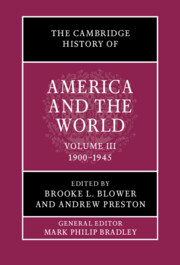Book contents
- The Cambridge History of America and the World
- The Cambridge History of America and the World
- The Cambridge History of America and the World
- Copyright page
- Contents
- Figures
- Maps
- Contributors to Volume III
- General Introduction: What is America and the World?
- Introduction to Volume III
- Part I American Power in the Modern Era
- 1 The Sinews of Globalization
- 2 The Territorial Empire
- 3 Waging World War I
- 4 Technological Transformations
- 5 Law and American Power
- 6 Latin America and US Global Governance
- 7 Transatlantic Relations
- 8 The Open Door, Tsarist Russia, and the Soviet Union
- 9 The Rise of the Modern Middle East
- 10 Competing Empires in Asia
- 11 Making a Modern Military
- Part II Competing Perspectives
- Part III The Perils of Interdependence
- Index
3 - Waging World War I
from Part I - American Power in the Modern Era
Published online by Cambridge University Press: 12 November 2021
- The Cambridge History of America and the World
- The Cambridge History of America and the World
- The Cambridge History of America and the World
- Copyright page
- Contents
- Figures
- Maps
- Contributors to Volume III
- General Introduction: What is America and the World?
- Introduction to Volume III
- Part I American Power in the Modern Era
- 1 The Sinews of Globalization
- 2 The Territorial Empire
- 3 Waging World War I
- 4 Technological Transformations
- 5 Law and American Power
- 6 Latin America and US Global Governance
- 7 Transatlantic Relations
- 8 The Open Door, Tsarist Russia, and the Soviet Union
- 9 The Rise of the Modern Middle East
- 10 Competing Empires in Asia
- 11 Making a Modern Military
- Part II Competing Perspectives
- Part III The Perils of Interdependence
- Index
Summary
In 1917, President Woodrow Wilson’s case for entering World War I (then known as the Great War) relied heavily on allegations that Germany was flouting international law by using U-boats to sink merchant and passenger ships traveling between the United States and the Allied nations, primarily Great Britain and France. Two and a half years after the war began, Wilson asserted that it was time to put neutrality aside.
- Type
- Chapter
- Information
- The Cambridge History of America and the World , pp. 85 - 107Publisher: Cambridge University PressPrint publication year: 2022



